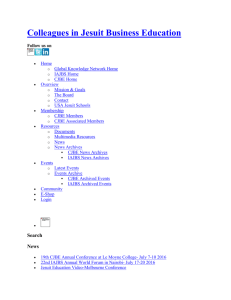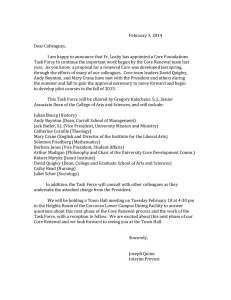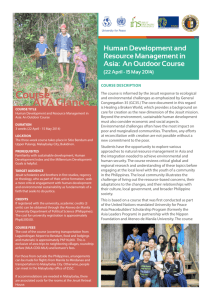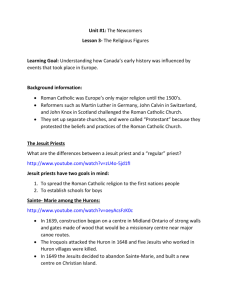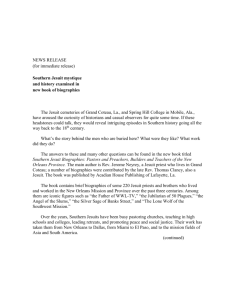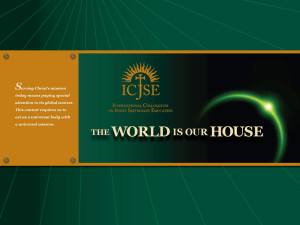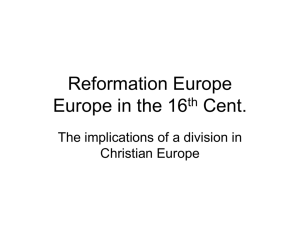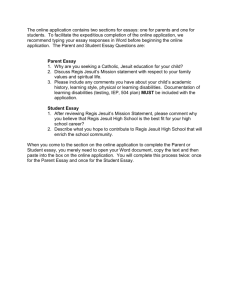I. The Core Curriculum and the Mission of Boston... Boston College seeks to foster the rigorous intellectual development and... The Vision Animating the Boston College Core Curriculum
advertisement
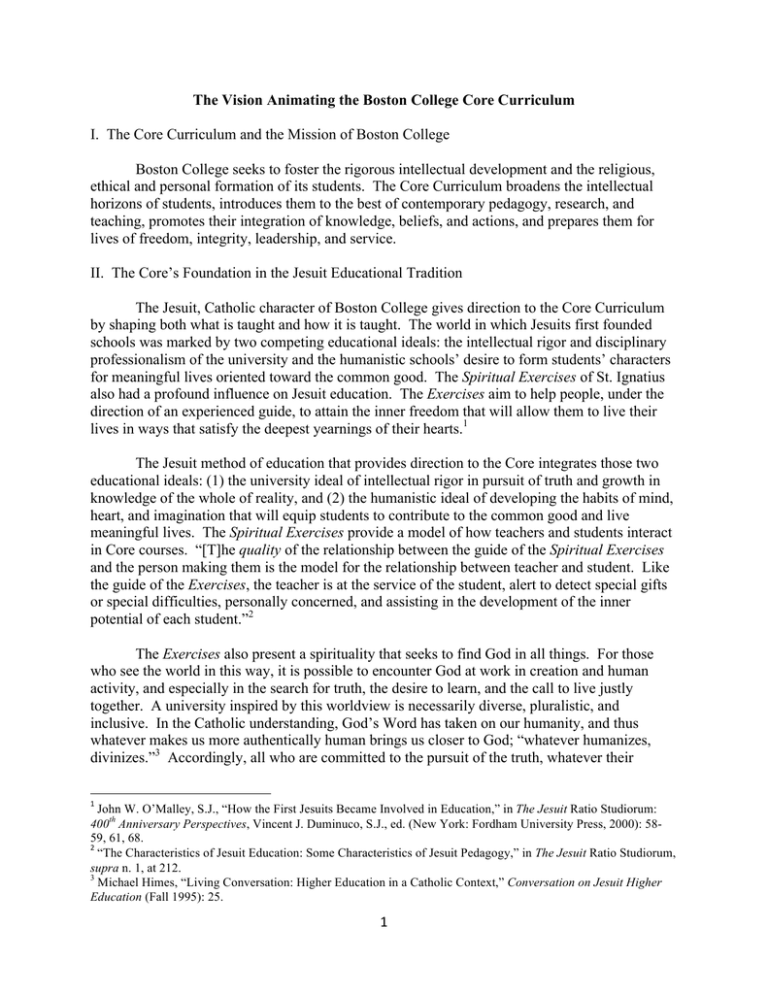
The Vision Animating the Boston College Core Curriculum I. The Core Curriculum and the Mission of Boston College Boston College seeks to foster the rigorous intellectual development and the religious, ethical and personal formation of its students. The Core Curriculum broadens the intellectual horizons of students, introduces them to the best of contemporary pedagogy, research, and teaching, promotes their integration of knowledge, beliefs, and actions, and prepares them for lives of freedom, integrity, leadership, and service. II. The Core’s Foundation in the Jesuit Educational Tradition The Jesuit, Catholic character of Boston College gives direction to the Core Curriculum by shaping both what is taught and how it is taught. The world in which Jesuits first founded schools was marked by two competing educational ideals: the intellectual rigor and disciplinary professionalism of the university and the humanistic schools’ desire to form students’ characters for meaningful lives oriented toward the common good. The Spiritual Exercises of St. Ignatius also had a profound influence on Jesuit education. The Exercises aim to help people, under the direction of an experienced guide, to attain the inner freedom that will allow them to live their lives in ways that satisfy the deepest yearnings of their hearts.1 The Jesuit method of education that provides direction to the Core integrates those two educational ideals: (1) the university ideal of intellectual rigor in pursuit of truth and growth in knowledge of the whole of reality, and (2) the humanistic ideal of developing the habits of mind, heart, and imagination that will equip students to contribute to the common good and live meaningful lives. The Spiritual Exercises provide a model of how teachers and students interact in Core courses. “[T]he quality of the relationship between the guide of the Spiritual Exercises and the person making them is the model for the relationship between teacher and student. Like the guide of the Exercises, the teacher is at the service of the student, alert to detect special gifts or special difficulties, personally concerned, and assisting in the development of the inner potential of each student.”2 The Exercises also present a spirituality that seeks to find God in all things. For those who see the world in this way, it is possible to encounter God at work in creation and human activity, and especially in the search for truth, the desire to learn, and the call to live justly together. A university inspired by this worldview is necessarily diverse, pluralistic, and inclusive. In the Catholic understanding, God’s Word has taken on our humanity, and thus whatever makes us more authentically human brings us closer to God; “whatever humanizes, divinizes.”3 Accordingly, all who are committed to the pursuit of the truth, whatever their 1 John W. O’Malley, S.J., “How the First Jesuits Became Involved in Education,” in The Jesuit Ratio Studiorum: 400th Anniversary Perspectives, Vincent J. Duminuco, S.J., ed. (New York: Fordham University Press, 2000): 5859, 61, 68. 2 “The Characteristics of Jesuit Education: Some Characteristics of Jesuit Pedagogy,” in The Jesuit Ratio Studiorum, supra n. 1, at 212. 3 Michael Himes, “Living Conversation: Higher Education in a Catholic Context,” Conversation on Jesuit Higher Education (Fall 1995): 25. 1 beliefs, are invited to share their expertise, intelligence, and imagination as full participants in introducing students to the search for truth and meaning that animates the Core Curriculum. III. The Core Curriculum as a Distinctive Component of the Boston College Undergraduate Experience Boston College’s commitment to liberal education demands the highest quality scholarship that integrates the development of new knowledge, reflection on enduring questions, and creativity in responding to contemporary problems. At Boston College, this commitment has four primary components: (1) a Core Curriculum that establishes a common intellectual foundation for all undergraduates, (2) a major that provides a curricular sequence for intense exploration of a particular discipline, (3) electives that allow the pursuit of particular interests outside of the Core and the major, and (4) campus community life that offers opportunities for personal, religious, and social growth outside the classroom setting. In providing a common intellectual foundation for all undergraduates, the Core introduces students to serious academic and personal exploration. It invites them into a conversation about questions that have long concerned reflective people and to enter into a dialogue of faith and reason in pursuit of truth. The Core provides information and perspective and encourages sound judgment and the beginning of wisdom. It counteracts the contemporary danger of superficiality stemming from quick access to vast amounts of information and the expression of opinions without the “laborious, painstaking work” of serious inquiry and reflection.4 Faculty teaching in the Core, in partnership with colleagues from the offices of Mission and Ministry and Student Affairs, are encouraged to enable students to explore beyond the classroom, engaging them in experiences and service opportunities on and off campus, connecting what is learned with the world around the university. The Core Curriculum thus furthers the development of the intellectual, reflective, ethical, and creative habits of mind that will enable students to become lifelong learners, to seek meaning in their lives, and to work toward constructing a more just and human world. Individual Core courses work together to contribute to the Core’s shared goals of opening the mind and heart, encouraging character formation, deepening human sympathy, inspiring creativity, enriching understanding of human diversity, and stimulating clear thought and persuasive expression. Students are expected to develop an adroitness of mind in meeting new questions and to lay a foundation for exploring questions they will encounter not only in their more specialized studies but also throughout their lives.5 IV. The Substance of the Boston College Core The first Jesuit colleges sought to introduce students to the best of what was known at the time. Today, the disciplinary breadth of the Core reflects the same conviction: faculty experts 4 Adolfo Nicolás, S.J., Depth, Universality, and Learned Ministry: Challenges to Jesuit Higher Education Today, remarks at Mexico City (April 23, 2010). 5 See “Jesuits and Jesuit Education: A Primer” (from Jesuits and Boston College: A Working Paper for Discussion, prepared by the Boston College Jesuit Community, 1994), in A Jesuit Education Reader, George W. Traub, S.J., ed. (Chicago: Loyola Press, 2008): 41. 2 introduce students to the foundational ideas and methods of inquiry in the major disciplines that comprise the university. Becoming educated requires careful and conscientious study in fields from theology and history to philosophy and literature, from mathematics and physics to the arts to political science and beyond. The humanities and natural and social sciences help ground our understanding of who we are, what it means to be human, how the world works, where we come from, and where we are going. Disciplinary specificity provides a necessary, but not sufficient, depth of inquiry: the desire to know aspires to understand how things might be connected into a more meaningful whole. Through engagement with the distinctive ways of searching for truth in the disciplines, the Core Curriculum invites students and faculty to see how the various disciplines, with all their specificity, differentiation, and limitations, might work together to construct an integrated understanding of reality. Just as true knowledge is not mere information, genuine wisdom requires attention to the wholeness we desire and to the development of a moral compass that unites the mind, heart, and imagination in reflective action. The solutions to 21st century problems require both disciplinary specificity and depth and a broader perspective. Intellectually satisfactory efforts to explore enduring questions and complex problems today benefit from a range of disciplinary perspectives. The Core Curriculum, therefore, works to promote interdisciplinary inquiry and expression. As a Jesuit, Catholic university, Boston College is grounded in a “faith that seeks understanding” and in the proposition that thinking is an essential part of believing. The Core embodies that principle, not only in theology’s scholarly exploration of faith, but in the conviction that the search for truth in any discipline is part of the search for God. V. The Distinctive Role of Faculty Who Teach in the Core The Jesuit educational tradition was founded on the premise that teaching the best of what was known should be combined with character formation in service of the common good. While many modern universities have deemphasized the latter, Jesuit colleges and universities today have refused to abandon this commitment and envision a special role for the teacher: caring for students as whole persons and helping them to integrate what they learn with how they live. Faculty teaching in the Core should be attentive to the context of their students’ lives, striving to teach these students, rather than simply a body of material, helping students to see why their Core courses matter in their lives. To care about – to become reflectively engaged – is to care for. A meaningful life is found neither solely in knowledge nor in action, but in the reflective interplay of what one understands and believes and how one acts, especially in the service of others: Why does studying this material contribute to better understanding what it is to be a person? Who am I becoming as I engage this material? How does my study of this material contribute to my better understanding of the world in its wholeness? Finally, faculty who teach in the Core share with their students the passions that have guided them in their own vocations, helping students to care about learning as a fundamental 3 starting point for becoming citizens, leaders, and human beings of depth of thought, creative imagination, and compassion. To care about learning, therefore, is to care for one another and for our world. Faculty who share their love of learning with their students can change students’ interests and lives and open up possibilities for the mutually enriching encounters, conversations, reflection, and discernment that lead to wisdom. VI. Core Curriculum Learning Outcomes Guided by this vision, students completing the Boston College Core Curriculum will: 1. Demonstrate the critical, mathematical, informational, analytic, expressive, and creative skills that are essential tools of the educated person well-prepared for a meaningful life and vocation. 2. Understand the major ideas and methods of inquiry of the scholarly disciplines that comprise the university and be able to use those methods of inquiry as beginning practitioners to address complex contemporary problems. 3. Be able to identify and articulate the strengths and limitations of the disciplines and the relationship of the disciplines to one another, and demonstrate an understanding of the breadth and diversity of human knowledge as well as its openness to integration in more comprehensive wholes. 4. Be conversant with and able to discuss intelligently enduring questions and issues that are fundamental to human inquiry and that have shaped the traditions from which the university has emerged. 5. Demonstrate the ability to apply more than one disciplinary perspective to the same enduring question or complex contemporary problem. 6. Be familiar with the scholarly exploration of religious faith and understand how faith and reason are related in the search for truth. 7. Demonstrate the ability to examine their values and experiences and integrate what they learn with the principles that guide their lives. 8. Be prepared and disposed to use their talents and education as engaged global citizens and responsible leaders in service of the common good. 4
